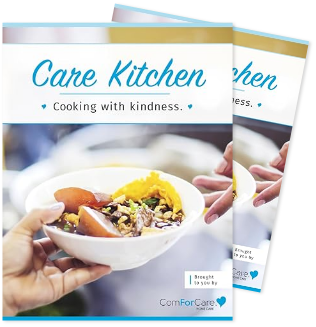Looking for In-Home Care? See All Services
Looking for In-Home Care? See All Services

Many older adults struggle to get the nutrition they need — especially if they live alone, have limited mobility, or are managing a chronic condition. Poor nutrition can lead to fatigue, illness, and even hospital stays.
That’s why ComForCare created the Care Kitchen, a program that offers nutrition services for seniors to help them stay healthy, strong, and independent. We provide education, meal planning tools, access to community resources, and practical support so older adults can eat well — even on a limited budget or with dietary restrictions.
ComForCare’s Care Kitchen offers more than just advice — we provide hands-on support for older adults to meet their nutritional needs every day.
Our services include:
We work closely with senior centers, food programs, and family caregivers to make sure older adults don’t go without healthy, nourishing meals.
Whether your loved one needs help cooking, understanding nutrition labels, or finding home delivered meals, we’re here to help.
Meal planning helps prevent nutritional gaps, making it easier to manage blood pressure and cholesterol, maintain a healthy weight, keep energy levels high, and get all the proper nutrients for healthy living. Meal planning is a great way to manage chronic conditions, but it can boost health and improve quality of life for anyone! At ComForCare, our caregivers focus on finding the types of food, combinations of food, portion sizes, and meal timing that will help their clients thrive.
One of the first steps toward achieving healthy eating goals is to identify your loved one’s barriers and create a plan to overcome them together. ComForCare’s caregivers can use a number of strategies to help, including:
Our needs change as we get older. For example, seniors may need more protein and less calories than they used to, and the types of nutrients (vitamins and minerals) they need may shift as well. Generally, we encourage foods higher in nutrients and lower in calories, avoiding “empty calories” like chips and candies, processed foods, sodas, and alcohol. Instead, we focus on fruits and veggies, low-fat or fat-free dairy products, lean meats, seafood, whole grains, eggs, and beans.
Seniors’ bodies tend to have a harder time removing sodium as kidney function decreases, which means they need to be especially careful when it comes to salt intake. Sodium isn’t all bad—it helps regulate the balance of fluids in the body and support the functions of muscles and nerves. However, to avoid the heart risks of too much sodium, people ages 51 to 70 should strive for at least 1,300mg per day but no more than 2,300mg. For adults over 70, the minimum suggested intake is 1,200mg.
As we age, we naturally lose muscle mass, which can lead to falls and other injuries. Getting enough protein can prevent muscle loss, support immune function, and even help blood circulate oxygen through the body. Getting enough protein can be a challenge, even if you do meet your meat, poultry, and egg intake goals. But there are plenty of other great sources of protein for meals and snacks, such as dairy, fortified soy products, beans, lentils, peas, and more!


Each office is independently owned and operated
and is an equal opportunity employer.
© 2026 ComForCare Franchise Systems, LLC.
Contact Us
(800) 886-4044